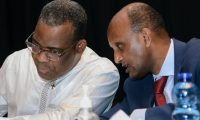Ethiopia’s Human Rights Commission steps into the role of a human rights watchdog

In 2019, Daniel Bekele (right) was appointed head of the Ethiopian Human Rights Commission. The Danish Institute for Human Rights supports the Commission in fulfilling its mandate to promote and protect human rights.
In October 2013, the Global Alliance of National Human Rights Institutions (GANHRI) rejected the application by the Ethiopian Human Rights Commission (abbreviated EHRC or the Commission in the following) for A-status accreditation. GANHRI concluded that the Commission had failed to submit any recommendations to new and existing legislation that would impact people’s enjoyment of human rights, and that the Commission had discontinued publishing and disseminating annual human rights reports.
Then, in 2022, the Commission submitted recommendations regarding four pieces of legislation. Two concerned the protection of internally displaced persons and the rights of persons with disabilities.
EHRC also submitted comments on the Criminal Procedure Law and the Rules of Evidence to ensure compliance with human rights commitments.
Throughout 2022, EHRC issued 50 publications, including statements and reports that critically examine the human rights situation in Ethiopia. This change marks a significant milestone in the Commission’s transformation into a body that responds to and shares its opinion on the human rights situation in the country.
Our partnership with the Ethiopian Human Rights Commission is funded by the Governments of Denmark, Germany, Norway and the UK.
The publications included the report ‘Violations of Human Rights, International Humanitarian Law and Refugee Law in Afar and Amhara Regions of Ethiopia’, published on 11 March 2022. The report outlined widespread human rights violations against civilians committed by all parties to the conflict.
In September 2022, EHRC published a report condemning the additional judicial killings, bodily injuries and looting of properties of citizens in Gambella City, following the clash between Oromo Liberation Front, Gambella Liberation Front and regional government forces. The report called for all perpetrators, including the regional government forces, to be held accountable and brought to justice.
Another highlight in 2022 was ‘The Annual Human Rights Situation Report’ covering the Ethiopian year from June 2021 to June 2022. The Commission presented the annual report to the Parliament followed by a press conference where it was shared with the public.
Throughout the year, the Commission continuously issued statements which focus on critical issues and recommendations for urgent action. As examples, in June 2022 the Commission released a statement
demanding the release of people of Tigrayan descent detained in camps in the Afar region. In July 2022, the Commission published another statement demanding both the federal and regional forces to disclose the whereabouts of illegally detained media personnel and other prisoners and to release them if criminal charges had not been instigated against them.
In September 2022, EHRC released a statement condemning the civilian killings and attacks by armed groups in the Oromia Region.
In July 2019, Daniel Bekele was appointed Chief Commissioner of EHRC, and he initiated the transformation of the Commission. In 2021, the application by the Commission was reconsidered and it was awarded A-status by GANHRI.
Bekele described the announcement as a milestone, noting the invaluable contribution of the Commission’s staff members in the reform process and in executing its mandate, in the current difficult context.
“The upgrading from the “B” status which EHRC had held since November 2013 to “A” status is a testament to the global recognition of EHRC as an independent and effective national human rights institution fully compliant with global standards”, Daniel Bekele says.
The Danish Institute for Human Rights has worked to support the Commission in fulfilling its mandate to promote and protect human rights since 2019.
A-status accreditation signifies that a national human rights institution is credible and independent, adhering to the internationally recognised minimum standards set out in the Paris Principles. The Principles mandate that national human rights institutions maintain independence in their legal structure, membership, operations, policy, and resource control.
The Global Alliance of National Human Rights Institutions (GANHRI) is responsible for reviewing and accrediting national human rights institutions based on their compliance with the Paris Principles. National human rights institutions that fully comply with these Principles receive A-status accreditation, while those that partially comply are granted B-status.
With A-status, a national human rights institution gains independent participation rights at the United Nations Human Rights Council as well as full membership of GANHRI, including the right to vote and hold governance positions.
